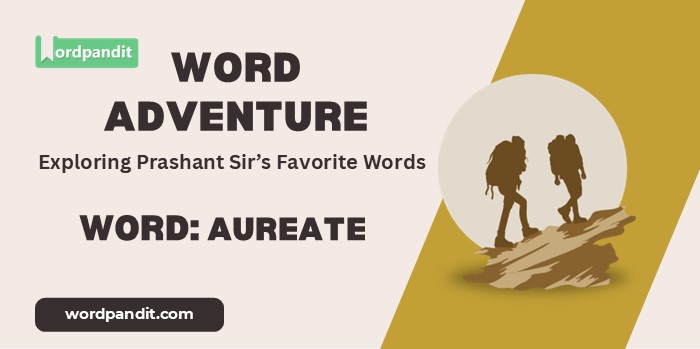Word Adventure: Aureate
The Headline
“All That Glitters: The Golden Grandeur of ‘Aureate’ Language”
The Scoop
In the treasury of English vocabulary, some words shine with particular brilliance. ‘Aureate’ is one such gem – a term that describes both the physical gleam of gold and the ornate flourishes of elaborate language. Let’s explore this multifaceted word that bridges the visual and verbal arts.
Let’s Break It Down
The Plot Thickens
‘Aureate’ shares its golden roots with words like ‘aurum’ (the chemical symbol Au for gold) and ‘aurora’ (the dawn with its golden light). This connection to gold began in the physical realm, describing objects with golden hues or gilded surfaces.
During the Renaissance, when elaborate language was highly prized, ‘aureate’ expanded its meaning to describe writing style. Just as gold leaf could adorn a manuscript’s pages, aureate language could embellish prose and poetry with ornate expressions and grand rhetorical flourishes.
Today, the word maintains both meanings, serving as a bridge between visual and verbal luxury. It can describe anything from autumn leaves to elaborate literary prose, making it a particularly versatile term for discussing both physical and linguistic opulence.
Word in the Wild
The Twist
Here’s an intriguing irony about ‘aureate’: while it describes elaborate, ornate language, the word itself is relatively simple and elegant. It’s like a master craftsman who creates elaborate works while dressing simply – the word demonstrates that you don’t need to be ornate to describe ornateness!
Make It Stick
Aureate: When your words wear their golden best!
Your Turn
Think about moments when you’ve encountered aureate language or aureate visual beauty. Was it in a baroque cathedral, a poet’s elaborate verse, or perhaps an autumn sunset? Share your golden experiences in the comments below. Let’s explore how this word bridges the visual and verbal realms of luxury!
Down the Rabbit Hole
- Curious about the history of gold in art? Explore the use of gold leaf in medieval manuscripts and religious paintings.
- Interested in elaborate writing styles? Research euphuism, purple prose, and the grand style in literature.
- Want to discover more color-based words? Look into terms like ‘cerulean’, ‘vermillion’, and ‘viridian’.
The Last Word
As we conclude our exploration of ‘aureate’, I hope you’ve gained appreciation for this word that gilds both our visual and verbal worlds. It reminds us that beauty can manifest in both what we see and what we say. The next time you encounter something gloriously golden or magnificently ornate in language, remember – you’re experiencing the dual brilliance of the aureate! Until our next word adventure, this is Prashant from Wordpandit, encouraging you to seek out the gold in both sight and speech!














